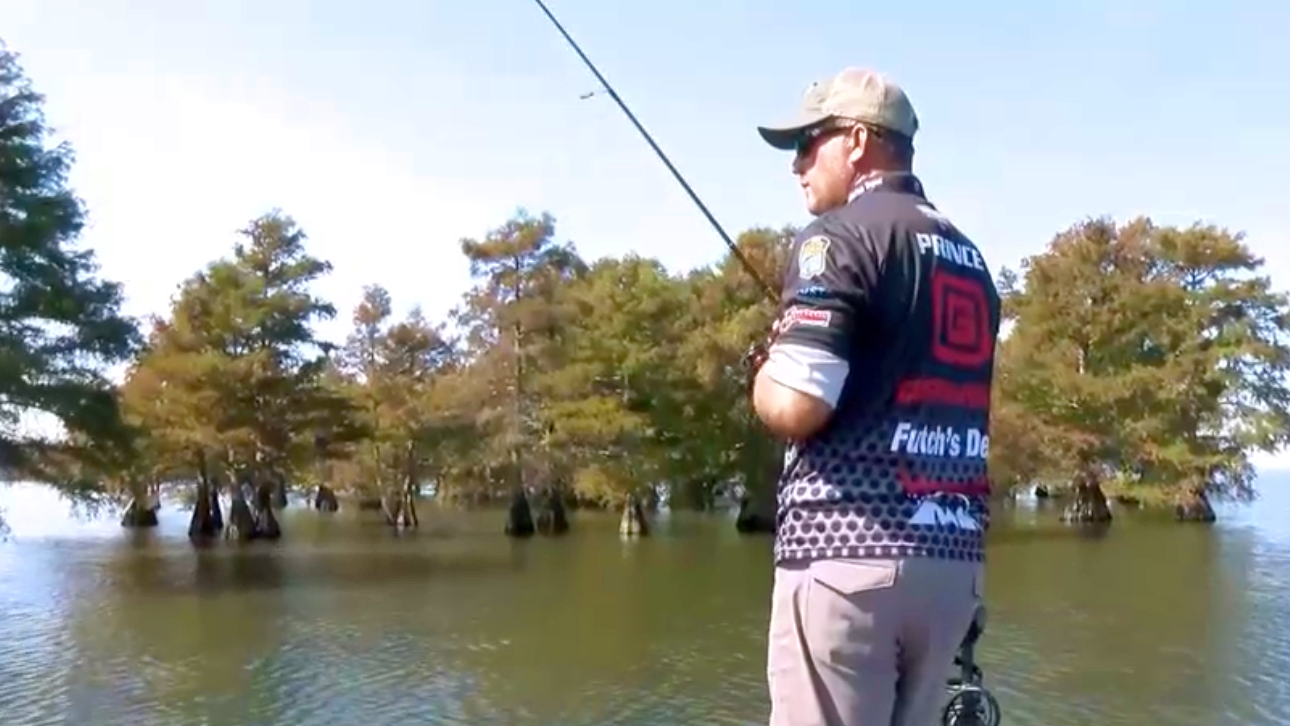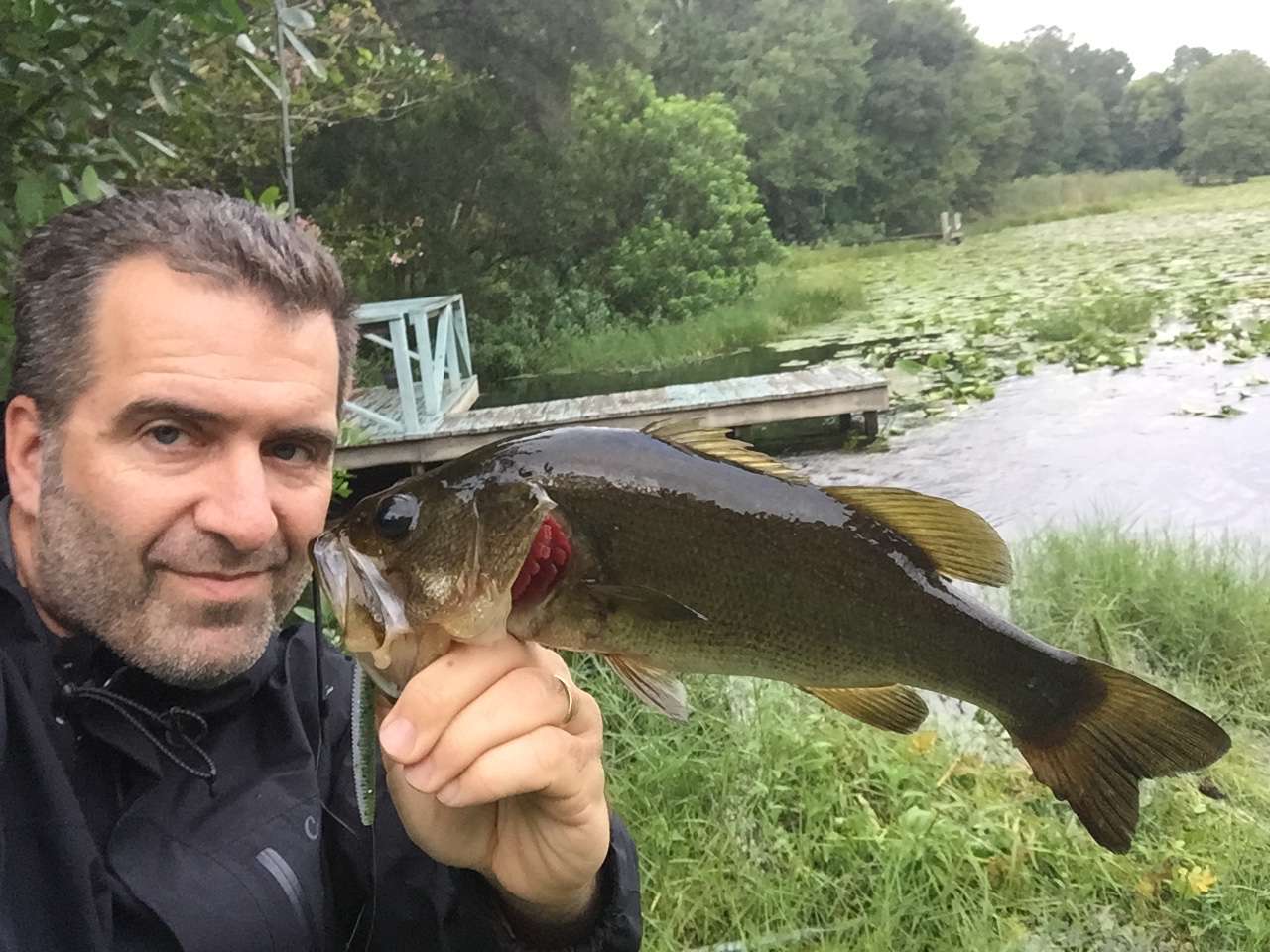
Versatility and adjustment always bode well for bass anglers, but the fall transition period tends to amplify that notion. We’ll likely see plenty of that as the Bassmaster Elite at Santee Cooper Lakes brought to you by the United States Marine Corps continues.
This massive two-lake system linked by a 6 1/2-mile diversion canal offers tremendous habitat options, but most anglers agree that it’s unlikely a single pattern and/or area will produce the win. Possibly the single most important element of successful strategies will be knowing when to shift gears.
Good example: Austin Felix, who placed third on Day 1 enjoyed a productive second-round start with an early limit of about 9 pounds on his offshore spot. Catching mostly cookie cutters, he wisely opted to preserve the numbers for tomorrow and shifted to his shallow flipping plan.
Brandon Palaniuk started the day in second place and after boxing a 3-pounder on the swimbait, he moved to punching mats and added a 3 1/2. With yet another change, Palaniuk caught his third keeper on a topwater.
Bolstering the adjustment premise, Bassmaster LIVE’s Davy Hite, made an interesting observation about his home state’s most famous fishery. Unlike spring tournaments, where super-aggressive and prespawn/spawn stage fish will chase baits that land in their general area, fall fish lack that motivation.
That means bites will demand more precise presentations. Miss the zone by a foot or less and the fish just may not feel like expending the effort.
Applying this to the shifting gears mindset, the upside of lower aggression levels is that fishing behind other anglers doesn’t necessarily imply fishing spent water. Make a better cast and win the prize, so to speak.
A few more points:
Know When to Go: Florida’s Cliff Prince entered Day 1 with a dock-fishing game plan, but abandoned that deal when a key stretch of wooden structures proved stingy. Prince said he used his test stretch as a barometer for the overall dock bite, but in retrospect, he realized the move might have been premature.
“I was going to stick with docks all day, but it didn’t happen for me quickly enough,” he said. “I knew I could get bit flipping trees; I just didn’t know the quality and that showed; I had 9 pounds, 1 ounce (66th place). I think if I would have stuck with the docks longer, I would have done better.”
Keep It Close: Abundant habitat is a double-edged sword and Stetson Blaylock recognizes the danger of burning the clock with too much moving — especially on a lake like Marion, where motor-munching stumps present navigational nightmares.
“In a lot of tournaments (changing game plans) is appropriate, but for here, it wasn’t,” Blaylock explained. “You can’t just take off and run across the lake; you have to run certain trails. I you’re going to move around, you have to have places close together.”
Blaylock’s 12-10 had him tied with Rick Morris for 37th place. Staying inside the cut line, he said, will require a little more expansion today.
“I don’t know this place well enough to make those (larger) adjustments, so I felt like I’d do better getting into an area and fishing it hard all day,” Blaylock said of his Day-1 strategy. “When I caught what I did by noon, I thought ‘I’ll just hang out here and maybe get one big bite and not burn through everything else I have.’
“Obviously, that was a mistake, because they caught ‘em a little better than I thought. I’m going to have to make some of those moves and adjustments (on Day 2) to make a top-40. I think I killed too much time in that area.”
When It’s Not Happening: Rookie Elite Destin Demarion was looking for the morning topwater bite he’d found in practice, but when 9:30 found him with an empty well, he shifted gears and salvaged his day with a flipping bite.
“I made another adjustment late in the day,” Demarion said. “I had a little stretch where I could throw a crankbait. After I caught my limit flipping, I went there and caught my biggest fish, about 3 1/2-4.”
Notably, Day-1 leader Carl Jocumsen got everyone’s heart pumping — including his — around 8:30 this morning when he set the hook on a huge bite.
“If this is a bass, it’s a giant!,” Jocumsen exclaimed. “It’s fighting weird. I don’t know if it’s a bass.”
Turns out, a hefty blue catfish had grabbed his white ChatterBait, but Jocumsen quickly pointed out a resonating truth about this fishery stocked with chunky Florida-strain largemouths: “That could just as easily have been a 10-pound bass as a big catfish.”
Sometimes, it just takes the right adjustment.

